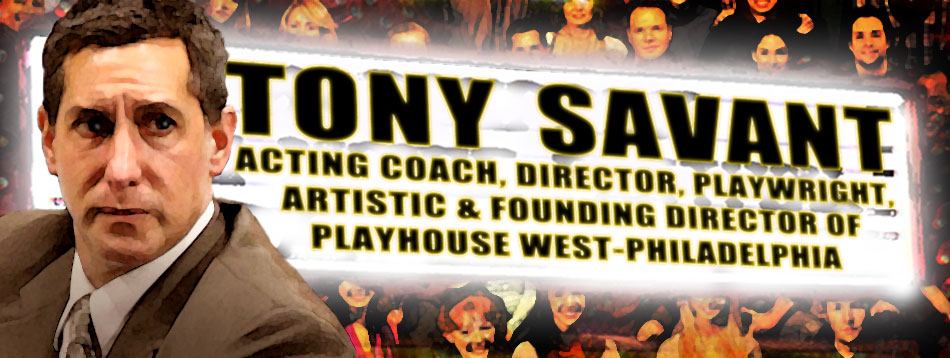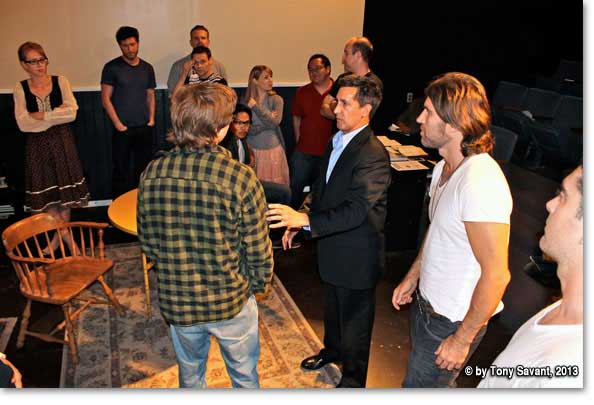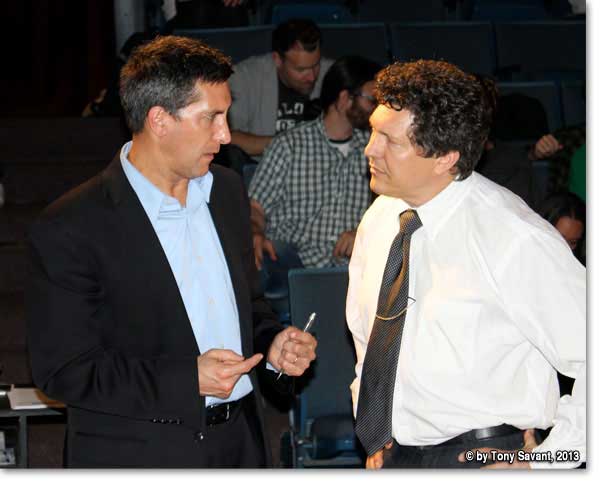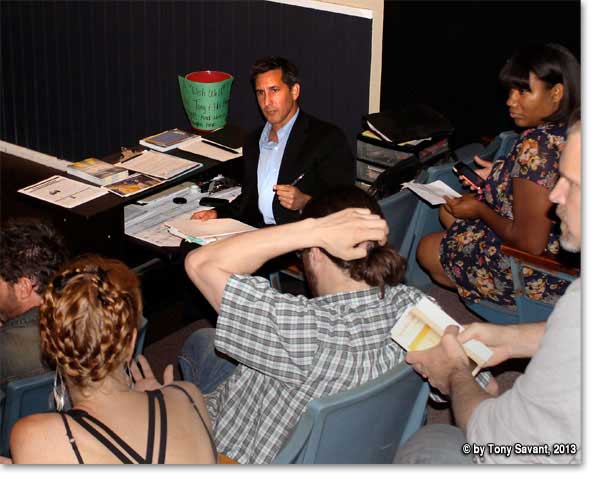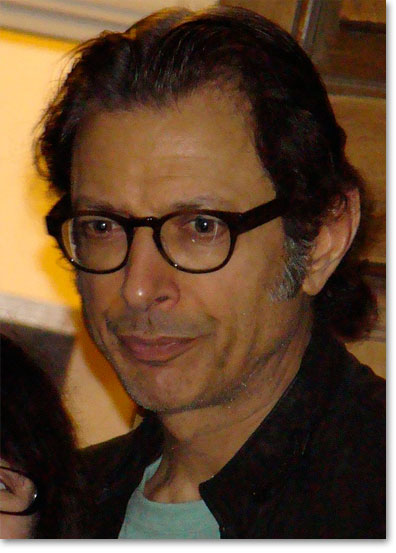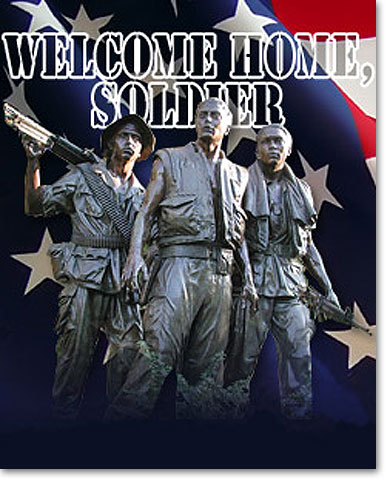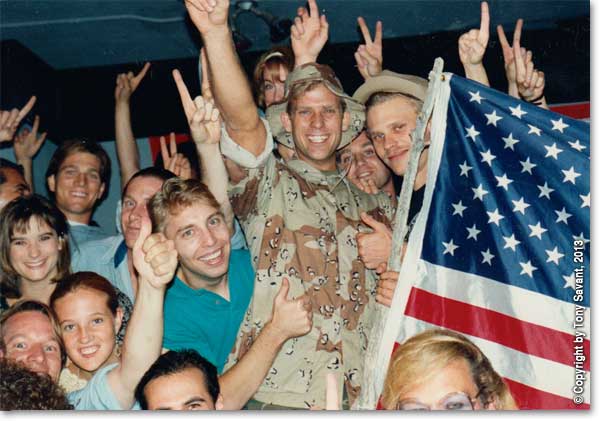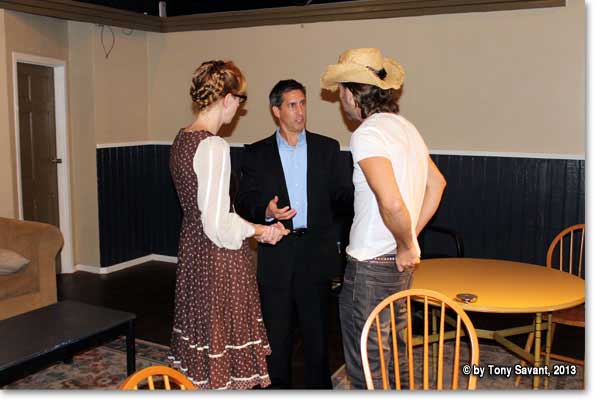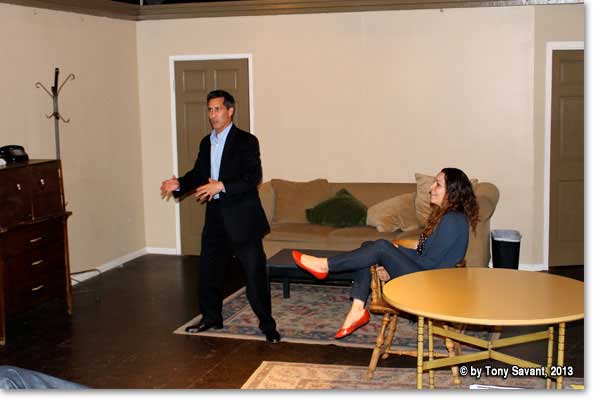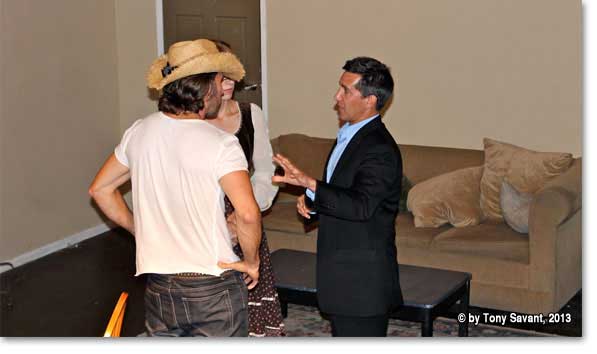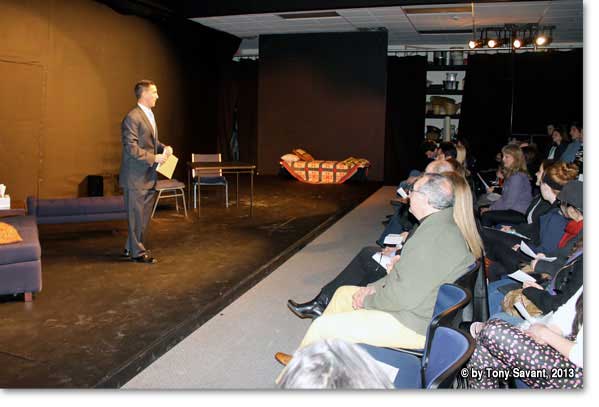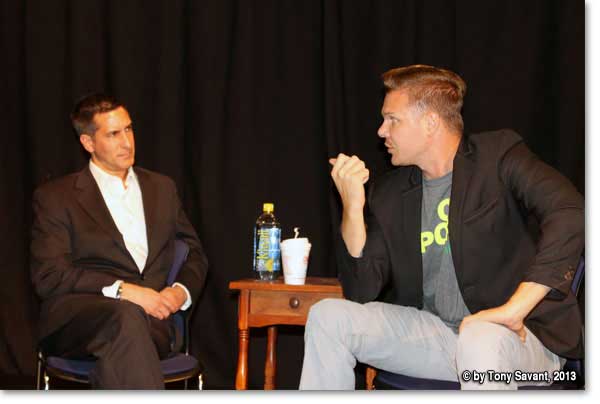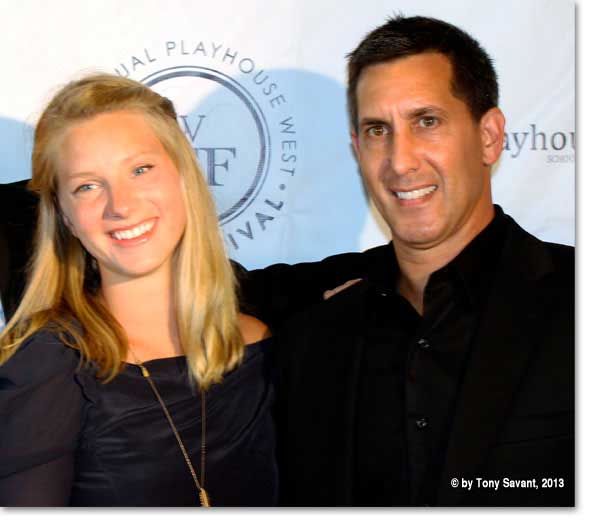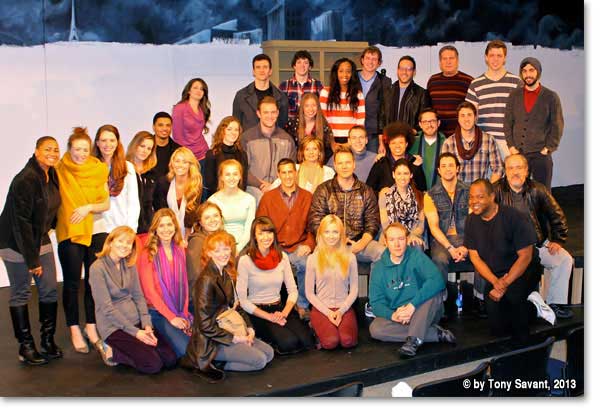|
||||||||||||||||||||||||||||||||||||||||||||||||||||||||||||||||||||||||||||||||||||||||||||||||||||||||||||||||||||||||||||||||||||||||||||||||||||||||||||||||
|
TONY SAVANT: That's a very good and important question. I think I would refer to it as having a teaching philosophy rather than a style. I definitely have a philosophy regarding teaching.
SL: Has someone inspired you to teach and if so, who? TS: Sure. Robert Carnegie, the founder of Playhouse West, was my teacher and mentor. He's a brilliant teacher. Without Bob I would know nothing about acting or how to teach it. I studied with Bob for eleven years. For eight of those years I sat next to him watching and taking notes. I did this five to six classes per week, writing down everything he said, asking him questions and learning how to teach. Jeff Goldblum also had an enormous influence on me. He's a real artist and I owe him a great deal. Sanford Meisner, of course. The last few years he taught I used to teach a class twice a week right after his, so as often as I could, I'd come early and try to watch him.
SHARON JORDAN: Part of the curriculum in advanced studies at Playhouse West is working through characters from the book, SPOON RIVER ANTHOLOGY, by Edgar Lee Masters. Would you like to share with us a little about this process? TS: The SPOON RIVER work is a major part of the advanced exercises we do and helps to really refine an actor's approach to a part. Boy, we use it teach so many things. First, it gives us a way to teach actors how to work on a speech, as that's what each story in the Masters book really is. Second, we use the speeches to teach about interpretation and how to read out from the text what the author is really trying to say, so an actor can get an accurate interpretation as to what the part is really about. Of course, we also teach the various ways one could go about rehearsing
SJ: When I was a student in your classes at Playhouse West in Los Angeles, I remember you telling us about the time you went over to Jeff Goldblum's house to read lines with him as he prepared for his upcoming role in the movie, JURASSIC PARK. I was very impressed with how Jeff read with you and how he acted out his role. Can you tell us a little about that experience? How does Jeff's perspective on preparing for a role help other actors? TS: It was the second JURASSIC PARK, THE LOST WORLD. In fact I was fortunate enough to be able be involved with and watch Jeff as he prepared for several movies over the years. Jeff is one of the hardest working actors you could ever meet. He works on his acting every day. When rehearsing he would start off just like we did in class. We would sit around his dining room table and do readings. But they weren't readings, they were acting rehearsals, the emphasis being on really talking and listening to each other, being connected, not so much on the actual words at first.
SL: You are also an accomplished playwright. Are there any tips for aspiring writers that you would like to share? TS: Number one tip, get the classic Lajos Egri book, THE ART OF DRAMATIC WRITING, read and study it over and over. And read great plays. Read all of Arthur Miller's plays, Eugene O'Neill, Tennessee Williams, William Inge, Lillian Hellman, Robert Anderson, Neil Simon, and the other great American playwrights. Of course read Ibsen and Chekov and the great world playwrights too. Also, read biographies of the great writers in order to understand why they wrote what they wrote. Great writers and artists always express something very personal in their work, and every writer should understand that. Study your craft by studying the best, not by watching television. Learn the fundamental principles of dramatics and dramatic construction and understand what goes into a work of lasting value and importance, which is what all real artists yearn to create. Then, do it. Write, and write and write. Start with one-acts, ten minute plays. If you can write a well-constructed ten minute play you can write a full-length. Mastering the one-act play form is a great start. SJ: I remember acting with you in the play, WELCOME HOME, SOLDIER, you co-wrote with Robert Carnegie. It is a very moving and touching play. Can you tell us more about what inspired you to create this play?
So, along with two other classmates, Derek Rydall and Michael Pettygrove, we did research and then I wrote a first draft for a play by the end of January. I visited Vet Centers and tried to speak to people over at the VA Hospital. Most people were not that helpful, I think because we were actors in Hollywood and they probably figured any play about Vietnam vets would be negative. There was one place that let us watch some videos and one guy who spoke a little about his experiences coming home. Anyway, along the way I came up with a kind of non-linear structure to give us a reason or platform to tell the stories of Vietnam vets coming home. I didn't want it to be like a big therapy session or bitch session. I thought the subject matter and the material so powerful, and doing it that way would not do it justice. And so, we had a kind of script, then we cast it with a bunch of advanced students and began rehearsing it under my direction. We rehearsed almost every night we didn't have class and also every Saturday and Sunday, refining and reworking it as we went. Well, to make a long story short, the Gulf War invasion happened and the war ended before the play was ready to be presented. At first I thought we wouldn't even end up doing it, but Robert said, go ahead since we put so much work into it. We ended up presenting it in April of 1991, on a Wednesday night, for just the students of Playhouse West. Again, at the time, all of us actually all thought we would do it that one time only. Little did we know... Anyway, there was one Vietnam Vet in the audience that night, the husband of one of our students. And he was blown away by the play. So were the students and so was Robert Carnegie. It was Robert who saw the potential for this to be a hit play that could touch lives and teach people, as if now has for all these years. So, he got involved with it then, helped re-write it and add material to it. Then, on the first Saturday of June, 1991, we opened for the public and the rest is history, as the say. SL: I enjoyed watching you as well as the rest of the cast perform WELCOME HOME, SOLDIER in Los Angeles awhile back. Do you have any favorite moments during the play that you would like to share with us?
Then, there was Glenn King, who had been a homeless vet, an alcoholic and drug addict when he first began coming to the play...I wrote a song called "HEROES AND WARRIORS", the lyrics at least. I sang it to Glenn, and he wrote the music. Glenn, a country singer, performed it at the end of the play one night. Ashley Judd was in the cast back then and she arranged for Glenn to go to Nashville and record the song with The Judd Boys Band, her mother's band and her producer, Don Potter. Amazing. Later, we got in touch with Glenn's high school sweetheart from Beaumont, Texas and sent her a cassette of the song. It was their first contact since he had come back from Vietnam. A few months later the cast pitched in to bring Wanda to the play and surprise Glenn. It was beautiful and very touching. The two reunited and ended up getting married. They live in Beaumont today and Glenn is an employed productive citizen. To think that a play can do that. Amazing. Getting to see John Allgood stand up after a performance and read a poem about the play where he stated that the play gave him back his pride. Or getting to know and become friends with men of great character, vets like John Pagel, who had dedicated his life helping family members of POW's and MIA's. Or getting to know families like the Hastings, Time and Deanne, and Brian and the rest of them, whose brother was shot down in Vietnam. Their father, Gene, came faithfully to the play for years and became a surrogate grandfather to the cast. When he died he requested to have cast members be his pallbearers. It has been such an honor getting to know these folks, and so many more I didn't mention. These people and these moments, and so many more like them over the years...it's been the honor of my life. I will probably never do anything as artistically meaningful, personal or powerful in my life as WELCOME HOME, SOLDIER.
TS: Oh, boy. I have many favorite plays it would be too hard to pick one. Plays are like food, sometimes you have an appetite for one kind over another. But I'll tell you some of my favorites. Ibsen's A DOLL'S HOUSE and Chekov's THE CHERRY ORCHARD are two favorites. I love Eugene O'Neill's plays, especially BEYOND THE HORIZON, and of course LONG DAY'S JOURNEY INTO NIGHT. I love Arthur Miller, DEATH OF A SALESMAN, a classic of course. But ALL MY SONS and A VIEW FROM A BRIDGE...powerful stuff. Anything by Tennessee Williams...but especially THE GLASS MENAGERIE, A STREETCAR NAMED DESIRE...And William Inge, one of my favorites, a master craftsman and his plays really speak to me, THE DARK AT THE TOP OF THE STAIRS, COME BACK, LITTLE SHEEBA, also many of his one-act plays. I adore Robert Anderson's TEA AND SYMPATHY, one of the best American plays, I believe. I'll just name a few other playwrights, like Lillian Hellman, Lorraine Hansberry...I love Neil Simon too. Can we just say I love reading plays. I'm quite obsessed with them, read them all the time, including contemporary plays. SL: Developing different types of characters in a play or screenplay like the protagonist, antagonist or helper character is important, as most writers know. Do you have any tips on what makes a good protagonist? How about an antagonist? Or a helper character?
SL: Sometimes, when I sit down to write a screenplay, the events seem to unfold so fast it is almost like I am not typing it (strange as that sounds.) And sometimes, I just stare at an empty page hoping something will come to me (i.e. the dreaded writer’s block). Do you ever suffer from writer’s block? If so, would you like to share some tips on how you combat that?
My opinion is that a writer should never even begin to attempt to write the actual script until a detailed, scene-by-scene outline has been completed. Many writers and producers might refer to this as the "story bible". This detailed, scene-by-scene outline is the final step before a writer actually begins to put it all down in screenplay form, but it contains every scene and all the details of that scene. Each scene has been thought through. A writer knows the specific purpose of the scenes, why it must be there, it's function, how it moves the story forward, the conflict, any potential foreshadowing in the scene, what it reveals about the characters, how it's wedded to and serves the theme or premise, and so forth. And before you work on the detailed outline you've already completed a shorter outline with all the major crisis points for each act. In other words, the whole story has been thought out in great detail prior to writing the actual script. If you do this, when you go to write the script you are just basically following the outline, so you should not get writer's block. Now, that doesn't mean you won't still labor and fuss over exactly the right collection of words you'll use to get it down on paper. That may still happen, and it's sometimes a frustrating and tedious task. I tell writers, the first time through just get the story down. The magic is in the re-writes. But, most writer's block is a product of not having practical steps to take toward the writing of a story, or knowing where you are in a process. When I teach screenwriting, I give writers a practical, step-by-step approach, so on any given day during the writing process you know exactly what work needs to be done. Writers should never sit staring at a blank screen saying, "I don't know what to do today." (Please check out Tony Savant's online screenwriting course at: www.ScreenwritingSavant.com) SJ: After being the Artistic Director at Playhouse West in Los Angeles for a number of years, you recently opened a new branch of the school in Philadelphia. What motivated you to move and open this new branch? TS: I'll try to make this a short one, because it's more personal. First off, after more than twenty-two years of teaching at Playhouse West in Los Angeles, if anyone would have told me last year that right now I'd be back in Pennsylvania teaching acting I'd have said they were nuts. But now here I am and I am enjoying this new challenge immensely. But, to answer the
And I'm happy to say it seems to working, and that she has made great progress health wise.As far as what motivated me to open the branch of the school out here. At first I didn't even conceive of opening a branch of Playhouse West in Philly. I thought I might try to find a way to teach out here, but honestly, I didn't know if that would work out or if I would just end up selling cars or something. The only thing that mattered to me was to get my wife healthy again. But when I told Robert Carnegie we were moving back east, and would I have his blessing to teach somewhere, he just said, "You'll open a branch of the school there. We'll call it "Playhouse West - Philadelphia." He was confident I could do it, and I'm eternally grateful to him for allowing me to continue to be associated with the school I feel like I've helped to build and make what it is. I am still working on the Playhouse West Film Festival, I still oversee the website and stuff, and so I am still very involved with the school in Los Angeles. SJ: We noticed that Jim Parrack (TRUE BLOOD, BATTLE LOS ANGELES) has been out to the new Playhouse West Branch in Philadelphia. What is Jim's involvement in the school and does he have future plans for Philadelphia?
He returned again in November and December to work on developing the script and see how he'd cast it. Then his original idea began to grow, I guess. What started out as a probably an idea for a short, experimental class film project eventually turned into an idea for a feature film. He came out again in January for more rehearsal and location scouting, then he returned in February and began principle photography on the 18th for a three week shoot, which just wrapped up. And he's coming back in April to finish shooting the rest of it. The entire student body of Playhouse West - Philadelphia is involved and the entire cast is comprised of my students. I also have a small role in it. I'm happy to say that Jim has been thrilled with how good everyone is and how well it's gone. The whole thing has brought enormous enthusiasm. Plus, the students are getting a tremendous opportunity to directly apply what they are learning in the classes to a real professional situation on a film set. In some ways they are getting spoiled because Jim's just a fantastic director and works so well with actors. Anyway, it's just been phenomenal. I will never be able to thank Jim enough for all he's done for me and for what he's meant to Playhouse West - Philadelphia. SJ: What do you envision for this school?
What we don't have right now is a studio or theaters of our own yet. We rent a space above the Heery Casting office in Philadelphia two days per week and we also rent a space in West Chester at a performing arts charter school. But eventually I want a space that is all ours. I will also continue to look for innovative ways to improve the program and the school, as I've always done. If you don't think you can get better or do things better than you become stagnant and eventually even the things you did do well begin to erode. I'm not one to rest on my laurels. Next year I want to be better than this year. SL: What's next for Tony Savant? TS: What's next? Hmmm...? I guess I'm already doing what's next. Right now I'm concentrated on building up this new branch of Playhouse West and training these actors out here in Philadelphia to be the best actors in the country. Philadelphia, as I learned only after moving out here, has never really had a serious, reputable acting school with ongoing training. I had no idea. So, I definitely want to change that. This is a great city for the arts, and when actors anywhere in the country are searching for a school to get serious training, I want Playhouse West - Philadelphia to be one of the ones they consider. I want this program and school here to be the envy of any program anywhere. I think that's the only way to approach anything. You have to want to be the best you can possibly be, which is exactly what I constantly tell my students. So, we are off to a great start, we have achieved a great deal in a short period of time, but I am also not taking anything about it for granted. I will keep working hard. You know, I had gained a certain status after all those years in L.A. There was great security for me there and it was very hard to leave that and feel like I'm starting all over. But now I am really enjoying this challenge and in many ways I know it's already made me a better teacher. I've love teaching, but honestly, right now I'm enjoying teaching more than I ever have. I will also continue to write and direct and be creative, and feel like being out here in the east is providing me with a whole new palette to work with. It's been a blessing and a real treat so far.
Playhouse West - Philadelphia on Facebook |
||||||||||||||||||||||||||||||||||||||||||||||||||||||||||||||||||||||||||||||||||||||||||||||||||||||||||||||||||||||||||||||||||||||||||||||||||||||||||||||||


